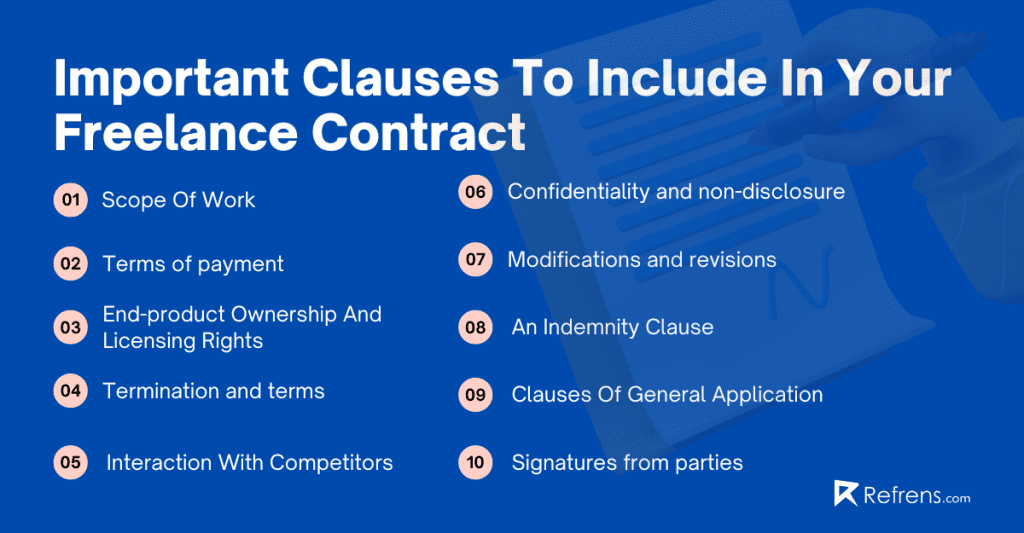Having a written contract with clients is always advantageous for freelancers. A well-crafted contract provides the necessary protection and assurance for both freelancers and clients. By establishing a contract, you can establish trust with clients, set expectations beforehand, and increase satisfaction with project outcomes and client experience. If you are a freelancer without a contract, it would be beneficial to consider creating one.
In this article, we will examine 10 clauses that other freelancers have found useful to include in their freelance contracts. By incorporating these clauses into your own contract, you can safeguard your business and concentrate on the work you enjoy.
Before delving into the details of a freelance contract, let’s first grasp the fundamentals.
What Is A Freelancer Contract?
A freelancer contract is a legal agreement between a freelancer and a client that outlines the terms and conditions of a project thoroughly. It specifies the scope of the work, payment details, timelines, and any other relevant information related to the project.
Generally, the contract serves as a formal document to ensure both parties have a clear understanding of their respective obligations and rights. This can keep misunderstandings and disputes at bay. A well-drafted freelancer contract can provide both the freelancer and the client with peace of mind and protection in case of any disagreements. What are some of the additional reasons for having a contract established?
Why Is It Important To Have A Freelancer Contract?
Commencing a freelance work arrangement without a contract is an error. A freelancer contract is beneficial for both you and your client, and there are various advantages to having one in place.
Here are a few of the many benefits of having a freelancing contract:
- Clarity & Understanding For Both The Parties
A detailed contract outlines the terms, inclusions, exclusions, deadlines, and other conditions of the project. This helps ensure that both freelancers and the client have a clear understanding of the scope of work, payment details, and any other important aspects of the project. This helps to avoid misunderstandings and disputes in the future!
This also keeps aside scenarios like “It was not included”, “this is not the deserving amount for this!” and so forth!
- Protection & Safety
When we said freelancing is risky, safety concerns were at the center of this thought. Safety in terms of getting timely payments, respect for work, and whatnot! A valid and precisely made freelancer contact ensures this!
A contract serves as a legally binding agreement, protecting both you and the client in case of any disputes or disagreements. It can help to ensure that you receive the compensation you are entitled to and that the client is held to the terms of the agreement. This also makes both parties more secure!
Check out how to work with unhappy clients in this blog post.
- Professionalism At Its Peak
Freelancing means you are not bound or committed to any particular firm you are delivering your services and are getting paid for it!
In such a scenario, having a contract in place assists in maintaining professionalism and taking your work seriously. It also demonstrates that you value your work ethic and are aware of the right work principles!
- Evidence In Case of Disputes
It is not scarce that disputes and legal issues arise in freelancing projects. Especially with international freelancers. A freelancer contract then becomes a life savior! It can provide evidence in terms of the agreement in case of any disputes or disagreements. The rate at which issues get resolved quickly and fairly also improves!
Check out how to find international clients as a freelancer.
But, all these benefits boil down only if you get the right clauses on paper. Right clauses? What are those? Let’s discuss these in detail!
Check out how to collect faster payments as freelancers.
Clauses To Add In A Freelancer Contract

1. Scope Of Work
Establishing a project scope inside the freelancer contract is critical for establishing work expectations throughout the project. Effective freelancer contracts spell out exactly what you’ll do for the client and when you’ll do it. The more exact and detailed brief you provide, the better. Many freelancers suffer from scope creep, which occurs when the quantity of work on a project grows without a change in budget or remuneration.
Check out why should your brief and budget align.
The following are some specific items to include in the project scope:
- Date of commencement
- Service’s scope
- Dates for the deadline and the end of the contract
- Payment schedule and rate
2. Terms Of Payment
You have fulfilled a critical element of the freelance contract if you have performed all of the duties mentioned in the contract’s description of work and services. There’s nothing more frustrating than completing a project and not receiving immediate payment for the work you’ve done. As a result, it’s critical to establish specific terms of payment in your freelance agreement. This section of the contract can include more information than just your hourly or fixed-project rate. When adding payment conditions to your freelancer contract, consider the following questions:
- Is the contract going to be paid on an hourly or fixed price basis?
- Is there a limit to the number of hours that can be billed?
- When are you going to get paid? At the time of delivery, 30 days later, and at specified milestones?
- Will you be given a deposit for a part of the total fee?
- Will your client be charged a late fee if they don’t pay on time?
- Who bears the financial and material costs of the project?
3. End-product Ownership And Licensing Rights
Copyrights or end product ownership refers to the legal ownership of the work produced as part of the project. This is essential as sometimes freelancers feel they hold the copyright for their produced service (content, design, or a website copy may be) while clients think that as they paid, they have complete rights as to when, where, and how they can share the product or service!
To rectify and keep these types of issues at bay, a copyright clause is added. This clause outlines who owns the rights to the final product and any related intellectual property, and if there are any restrictions on its use. For example, the freelancer may retain the rights to the work and only grant the client a license to use it. This can help to clarify the ownership of the work and protects both parties.
This clause could also refer to putting the project on display in your portfolio. It’s critical to seek permission before including any client work in your freelance portfolio, and securing that permission at the outset of the project helps make that conversation easier.
Check out how to get hired without a portfolio.
4. Termination Provision
If the partnership isn’t working out, including a termination provision or right to terminate in the contract creates a method for ending the freelance contract. Throughout the contract, either party may notice that things aren’t going as planned owing to a lack of communication, missing deadlines, or other factors. You can describe the reasons for termination as well as the costs or penalties connected with terminating the contract early in this section.
Even if you have a clear deadline and contract end date, freelancers typically feel this piece to be essential to include. It becomes even more important for ongoing work since it allows both parties to plan for the loss of money or work product if the contract is canceled.
5. Interaction With Competitors
It’s critical to emphasize to clients the uniqueness of your services as a freelancer. It’s possible that your client would not want you to work with them while also assisting the competitors. Your expertise in working with a client in the same industry but in a different geographic service area, on the other hand, could be considered a plus.
It’s advisable to spell out your policy for serving clients that may have services or business areas that overlap. Here are some questions to think about while writing your freelance contract’s competitive engagements section.
Will you do any business or engage in any activity that competes with the client’s business or service?
- How will overlapping clients’ conflicts of interest be disclosed?
- Is the geographic restriction for clients only applicable to the same sort of business?
- What is the duration of exclusivity? Is it possible for you to work for a competitor when your freelance contract is finished?
A non-solicitation or non-compete clause could be an extension of the restrictions imposed by your work with competitors. You should speak with an attorney to see if agreeing to such a condition is right for you and your company.
6. Confidentiality, Non-disclosure, And The Right To Reveal
It is critical to add a clause covering mutual non-disclosure of any secret information to safeguard both parties. You may obtain information about your client’s business as a freelancer that must be kept secret and confidential. Client lists, corporate plans, proprietary methods, secret recipes, financial information, and other types of information could be included.
The client will want you to keep any confidential information to yourself. This clause may stand alone, or a separate and more extensive non-disclosure agreement may be required (NDA). NDAs are legally enforceable contracts that establish a confidential partnership and spell out how confidential material will not be shared with competitors or others.
7. Modifications And Revisions
Work that is creative might be subjective. This clause specifies how many (if any) revisions the project will receive. This can safeguard a freelancer’s time against scope creep, which occurs when clients request multiple rounds of time-consuming modifications and changes.
You can define the fee you’ll charge for further edits or revisions in this area of the contract. To ensure that all parties are on the same page concerning changes to the project deliverables, it may be important to specify what constitutes a “round,” “edit,” or “revision.”
8. An Indemnity Clause
Who is to blame if something goes wrong?
Both parties will seek payment if the other side breaches the contract in this regrettable event. Indemnification, sometimes known as a keep harmless provision, is a clause that allows one party to shift potential expenses or responsibility to another in the event of specific events.
The fundamental benefit of an indemnification clause is that it can shield the indemnified party against losses or third-party claims arising from the contract or the contract’s activity or deliverables. Both parties may agree to reimburse the other for losses incurred by the indemnifying party’s violation of the contract in a mutual indemnity agreement.
9. Clauses Of General Application
A general clause is used to cover any extra elements that are introduced to the contract. Legal disclaimers, safeguards, and other remarks can be included in this area.
An arbitration provision is one example of a clause that can be included in a contract. Arbitration is an out-of-court dispute resolution method in which a neutral third party makes the final decision.
Although the majority of freelance assignments are successful, problems and disputes can occur from time to time.
10. Signatures From Involved Parties
All parties must agree to a legal contract in order for it to be valid. The most usual and straightforward way to establish this is to have both parties sign the freelancer contract. So, before beginning your next project, be sure that both you and the client have signed the document.

Common Problems That Freelancers Encounter When They Don’t Have A Contract
You probably now know how important it is to have a contract in place. Many people, however, claim that they do not require one because they have never had an issue.
Ironically, most freelancers don’t consider establishing a contract until they have a problem.
Regardless of your previous experiences, freelancers can encounter a variety of challenges if they don’t have a contract, including:
- Non-payment
- Boundless projects and scope creep
- There is no means to enforce what was agreed upon
- Liability and additional legal ramifications
- Protracted and pointless legal battles
Summary
We highly recommend that every freelancer enter into a contract. The freelancer contract is the first template we have listed as one of the most critical templates for freelancers.
Even though both parties aim for a satisfactory outcome from their dealings, having a robust contract that outlines the terms of your agreement with your client is one of the most effective ways to protect your business in case of a conflict. A freelance contract is a critical element of launching and maintaining a business, and not having one may jeopardize your clients’ trust and patronage.
Furthermore, paying close attention to detail is imperative when scrutinizing a freelancer contract. It’s crucial to ensure that the stipulations are mutually agreed upon, accounting for the expectations of both parties and emphasizing future results.
Start your freelancing career with Refrens and get expert advice on what to provide the client in a freelancer contract!


















